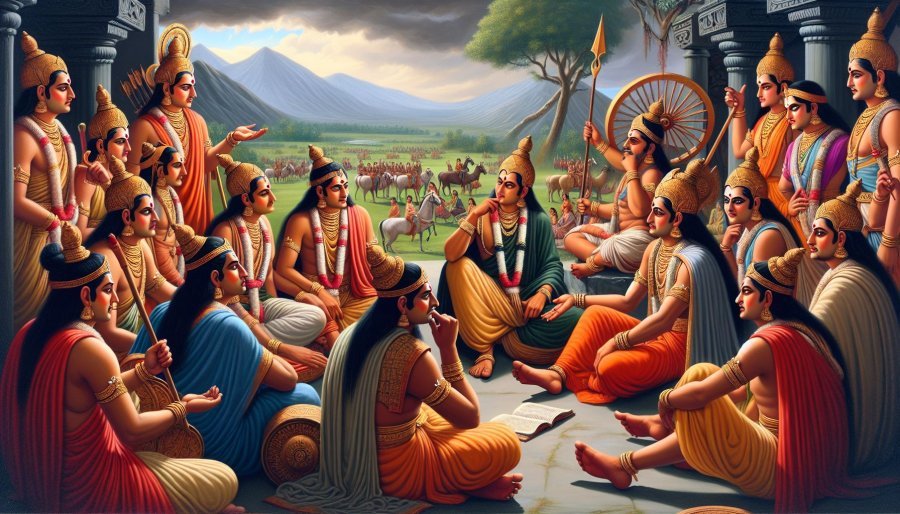Section CLXLVIII - Polyandry Debate: Yudhishthira's Justification and Vyasa's Explanation
Book index: Mahabharata (English)
This page contains a summary of the Mahabharata Section CLXLVIII including examples of moral lessons in daily life. The Maha-Bharata is one of the largest epics ever written containing roughly 100,000 Sanskrit verses. It deals with the legendary history of ancient India and contains a large number of interwoven tales.

Short summary of the chapter:
The story begins with all the Pandavas, the king of the Pancalas, and others saluting the illustrious Rishi Krishna (Dvaipayana) and asking him about the practice of one woman marrying multiple men without being defiled by sin. Drupada, Dhrishtadyumna, and Yudhishthira express their opinions on the matter, with Drupada viewing it as sinful, Dhrishtadyumna finding it morally questionable, and Yudhishthira citing examples of similar practices from the past as justification. Kunti also supports Yudhishthira's viewpoint, fearing the consequences of being untruthful. Vyasa then reveals to Drupada in private why the practice of polyandry is old and eternal, ultimately explaining why it is not sinful. The story ends with Vyasa leading Drupada to a private apartment for further discussion.
Full English translation:
This page is merely a summary which is automatically generated. If you are looking for authentic sources such as the Sanskrit text or the Full English translation of Mahabharata Section CLXLVIII - Polyandry Debate: Yudhishthira's Justification and Vyasa's Explanation, have a look at the following articles:
Section CLXLVIII, online text
English translation by Kisari Mohan Ganguli.
Read this and other chapters online.
Mahabharata (English Summary)
by Kisari Mohan Ganguli | ISBN-10: 8121505933
Buy the latest edition:
FAQ of Mahabharata, Section CLXLVIII:
Is polyandry considered acceptable in ancient texts?
In the story, Yudhishthira justifies sharing a wife based on historical precedents and maternal permission. The practice is debated among the characters, with some finding it sinful and others finding it virtuous.
What are the different opinions on polyandry in the story?
Drupada and Dhrishtadyumna find polyandry sinful due to moral and Vedic opposition. Yudhishthira and Kunti, on the other hand, justify it based on historical examples and maternal permission.
How does Vyasa justify polyandry in the story?
Vyasa explains the establishment of polyandry and why it should be regarded as old and eternal virtue. He leads Drupada to a private discussion to elaborate on the practice.
Daily life: Polyandry Debate: Yudhishthira's Justification and Vyasa's Explanation:
In the tale described, various characters engage in a discussion about the morality and tradition surrounding polyandry, confronted by the unconventional proposal of Draupadi marrying all five Pandava brothers. This scenario prompts a deeper exploration of ethical and societal norms, emphasizing the importance of dialogue and diverse perspectives in understanding complex issues. The central theme revolves around challenging established norms and seeking justification for actions that deviate from traditional practices.
Translating this into daily life, the story encourages open-mindedness and the willingness to question societal conventions. It suggests that individuals should consider the reasons behind their actions and beliefs, especially when faced with situations that go against the grain of widespread practices or beliefs. Moreover, it highlights the value of respecting and listening to various viewpoints to gain a comprehensive understanding of morally ambiguous situations.
The narrative also underscores the significance of prioritizing one’s principles and the consensus of those directly affected by the decision, as seen through Yudhishthira's stance and Kunti's concurrence. Respecting guidance from elders or those we hold in esteem, while aligning it with our sense of right and wrong, emerges as a key takeaway. Ultimately, the story invites us to explore the boundaries of morality, tradition, and personal ethics, advocating for thoughtful consideration and dialogue in navigating life's complex decisions.
